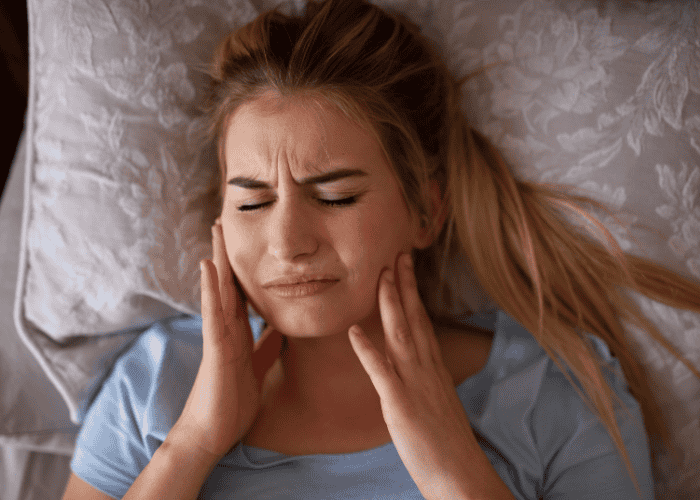Causes of Teeth Grinding in Teens & Support Options

It may be surprising to find information about teeth grinding on a mental health website. However, stress and anxiety are among the most common causes of teeth grinding – also known as “bruxism.” This is why stress management is often recommended to treat bruxism in teens.
Teeth grinding can cause many ailments, like headaches, jaw pain, dental problems, and poor sleep. If a teen is experiencing ongoing stress or symptoms of anxiety alongside these ailments, a mental health professional can provide insight and advice.
This page can also give you all the information you need on when the teeth grinding teens experience could be linked to a mental health issue by exploring:
- The mental health causes of teeth grinding
- Effects of bruxism in adolescence
- Stress management techniques to reduce teen teeth grinding
- Anxiety treatment options to promote mental health and well-being
- Where to find professional mental health support

Why Teens Grind Their Teeth During Sleep
Teeth grinding, also known as bruxism, is a common condition. In fact, studies show that around 12% of the population experiences bruxism in adolescence.9 But why does this happen?
Most experts believe that teeth grinding is one of several nighttime anxiety symptoms teens experience when they are under high levels of stress.10
When a person experiences stress, certain hormones in the brain, such as cortisol, activate the sympathetic nervous system. This causes the body to gear up for “fight or flight.”1 This process involves increasing the heart rate, speeding up breathing, and tensing the muscles, including the jaw.2 In fact, if you pay close attention, you may notice that you or other people clench their mouths and tense their jaws when angry or stressed. In other words, teeth grinding teens are likely stressed or anxious.
Teeth grinding can occur during the day or night. In both cases, a person may not initially realize they are clenching or grinding their teeth. Daytime bruxers may only realize they are grinding their teeth when they experience pain, allowing them the awareness they need to stop and relax the jaw. People who brux during their sleep, however, typically do not realize they are engaging in the behavior because they are not conscious of pain. For this reason, they may not be aware of the issue until a dentist flags tooth damage.
Although teeth grinding is among the most common sleep issues in teens, it can lead to numerous negative physical and mental health effects. In the following section, we discuss some of these consequences of teeth grinding, before turning to the steps you can take to manage the condition.
Effects of Teeth Grinding in Teens
Teens who grind their teeth in their sleep are often unaware that they are doing it until they begin to notice symptoms. When they experience morning jaw pain or stress-related headaches, teens may realize that something is awry. Bruxism can also lead to temporomandibular disorder (TMJ), so TMJ problems teenagers can develop could also prompt the diagnosis.
Health problems associated with teeth grinding include:
- Damage to teeth
- Damage to dental work
- Jaw pain that is most severe in the morning
- Headaches
- Temporomandibular joint (TMJ) problems, including pain
- Reduced sleep quality
- Reduced quality of life due to pain and sleep problems
- Increased risk of depression
With severe consequences like these, it is important to manage teeth grinding. But doing so often requires developing an understanding of why bruxism in adolescence happens in the first place.
Mental Health Causes of Teeth Grinding in Teens
Extensive research has shown a connection between stress and teeth grinding. For example, people brux more when experiencing heightened stress and anxiety levels than during periods of calm.3
Additionally, people who grind their teeth report more symptoms of anxiety than people who do not.3 Plus, it is well-known that stress can reduce sleep quality, so it’s unsurprising to learn that stress can contribute to bruxing. In other words, stress can lead to poor sleep, and poor sleep may, in turn, increase the likelihood of grinding teeth.2
With well-reported links between stress and teeth grinding in mind, mental health professionals often turn to stress management as an important component of reducing bruxism. This can include counseling on sleep hygiene and relaxation techniques.4
Stress Management to Reduce Teeth Grinding in Teens
Stress management and anxiety treatment for teens may help reduce teeth grinding. One component of stress management that is often recommended for teens who grind their teeth is sleep hygiene. We discuss this technique and another commonly used stress management method (progressive muscle relaxation) below.
Sleep Hygiene
Adolescent sleep disturbances are common and undermine overall health and well-being, in addition to contributing to bruxism.
Sleep hygiene refers to a set of behavioral and environmental practices designed to promote healthy sleep patterns.5 These practices have been established through scientific research, so they’re relatively reliable in their ability to promote healthy sleep.5
Recommended sleep hygiene practices for better sleep quality include:
- Maintaining a consistent bedtime and wake time, even on weekends
- Avoiding napping
- Using your bed only for sleep – so avoid studying or using your phone in bed
- Maintaining a comfortable sleeping environment free from stress, noise, or lights
- Setting your room to a cool temperature (60-67 degrees Fahrenheit) before bedtime
- Maintaining a consistent “wind-down routine” and avoiding excitement at bedtime
- Turning off screens and electronics an hour before bedtime and dimming your lights so your body can begin to release the sleep hormone called melatonin
- Stopping eating one to two hours before bedtime
- Avoiding caffeine, especially six hours before sleep
- Avoiding smoking or using alcohol
- Exercising regularly, but avoiding it before bedtime
- Seeking professional help for ongoing sleep or stress issues
As noted earlier, poor sleep is associated with increased risk of bruxism. Since good sleep hygiene promotes better sleep, these steps may reduce teeth grinding in teens.
In addition to improving sleep hygiene, experts often recommend learning relaxation techniques as part of a bruxism management plan.4 This is because relaxation techniques can be effective in stress management, and limiting stress reduces the risk of teeth grinding.
Relaxation Techniques for Teens
According to extensive research, stress can be lowered at both the psychological and physical levels through the practice of relaxation techniques.6 Therefore, it makes sense that relaxation techniques have also been shown to reduce bruxism in teens.7
While there are many forms of relaxation techniques, one well-studied one is called “progressive muscle relaxation.”
To use this strategy, try the following steps:
- Lie down comfortably, away from distractions
- Turn your attention to each of the muscle groups in your body, starting at the feet and moving up
- Tighten each set of muscles and hold for five seconds before releasing
- Notice how the muscle group feels different from how it did before actively tensing and relaxing it
- Once you’ve focused your attention on the sensation of relaxation, move on to the next group of muscles until you’ve practiced the technique all the way up to the top of your body
Once you have completed the technique, try to pinpoint a difference in how you feel both physically and mentally from how you did before you started.
Anxiety Treatment for Teens
Teeth grinding is often a symptom of an underlying anxiety disorder, like generalized anxiety disorder or social anxiety disorder. While self-help strategies such as improving sleep hygiene and practicing progressive muscle relaxation can help lower stress, anxiety disorders typically require professional intervention for the best results. Fortunately, anxiety has been studied extensively, and effective treatment options are now offered to reduce anxiety and its consequences.
Some of these treatment options include the following:
Cognitive Behavioral Therapy (CBT)
One type of anxiety treatment is called “cognitive behavioral therapy.” This is regarded as the gold standard for treating anxiety. It is a type of psychotherapy that has been studied extensively and is consistently found to be a safe and effective anxiety treatment. During CBT, a licensed therapist guides a teen in identifying and challenging unhelpful thoughts, beliefs, or behaviors. Then, the therapist helps the teen develop replacement thoughts and behaviors to better cope with life’s challenges.
Acceptance and Commitment Therapy (ACT)
Like cognitive behavioral therapy, acceptance and commitment therapy (ACT) is backed by extensive scientific research. It is effective in improving symptoms of stress, anxiety, and overall psychological well-being. Unlike CBT, however, this form of treatment encourages the teen to accept negative thoughts and emotions, while also committing to taking action to achieve goals based on their values.
Medication Therapy
There are several safe and effective medications to help reduce anxiety. Medications may be necessary in cases where someone experiences severe anxiety, as they may improve their ability to benefit from psychotherapy.8
For example, effective treatments for anxiety often involve a teen facing their fears after first learning helpful stress management skills to help them cope (exposure and response prevention). Since facing fears can be difficult, anxiety medications may be used to lessen the anxiety and fear.

Mission Prep: Professional Support for Teen Stress Management
Today’s teens face immense stress: academic demands, social pressure, concerns about the future, and more. Chronic stress can lead to a host of mental and physical health problems, including nighttime teeth grinding. Sometimes, managing stress can feel too daunting to do alone. That’s why we’re here.
At Mission Prep, we specialize in teen mental health care. From teaching self-care for anxious teens to offering structured individualized or group therapy, we are here to help you overcome stress and anxiety. Our team of mental health experts offers a variety of evidence-based approaches, medication management, and more.
If you’re ready to tackle bruxism in teens from a place of safety and trust, contact us today to begin your journey to optimal mental health.
References
- Chu, B., Marwaha, K., Sanvictores, T., Awosika, A. O., & Ayers, D. (2024). Physiology, stress reaction. StatPearls – NCBI Bookshelf. https://www.ncbi.nlm.nih.gov/books/NBK541120/#:~:text=A%20stressful%20situation%2 C%20whether%20environmental,fight%2Dor%2Dflight%20response.
- Robards, K. (2023, January 18). Understanding the relationship between bruxism and stress. Sleep Education. https://sleepeducation.org/understanding-relationship-between-bruxism-stress/
- Sutin, A. R., Terracciano, A., Ferrucci, L., & Costa, P. T. (2010). Teeth grinding: Is Emotional stability related to bruxism? Journal of Research in Personality, 44(3), 402–405. https://doi.org/10.1016/j.jrp.2010.03.006
- Lal, S. J., Sankari, A., & Weber, K. K. (2024, May 1). Bruxism management. In StatPearls. StatPearls Publishing. https://doi.org/10.5772/32360
- Alanazi, E. M., Alanazi, A. M. M., Albuhairy, A. H., & Alanazi, A. A. (2023). Sleep hygiene practices and its impact on mental health and functional performance among adults in Tabuk City: a Cross-Sectional study. Cureus, 15(3), e36221. https://doi.org/10.7759/cureus.36221
- Toussaint, L., Nguyen, Q. A., Roettger, C., Dixon, K., Offenbächer, M., Kohls, N., Hirsch, J.,& Sirois, F. (2021). Effectiveness of progressive muscle relaxation, deep breathing, and guided imagery in promoting psychological and physiological states of relaxation. Evidence-based Complementary and Alternative Medicine, 2021, 1–8. https://doi.org/10.1155/2021/5924040
- Miotto, Cs & Miotto, C & Vieira, G & Firsoff, Efo & Puliti, E & Greven, Markus & Marques, A. (2022). Massage, relaxation and exercise in bruxism: Is there difference? A randomized clinical trial. Journal of Clinical and Medical Research, 4. 1-19. 10.37191/Mapsci-2582-4333-4(1)-102.
- Garakani, A., Murrough, J. W., Freire, R. C., Thom, R. P., Larkin, K., Buono, F. D., & Iosifescu, D. V. (2020). Pharmacotherapy of Anxiety Disorders: Current and emerging treatment options. Frontiers in Psychiatry, 11, 595584. https://doi.org/10.3389/fpsyt.2020.5955844
- Smardz, J., Martynowicz, H., Wojakowska, A., Michalek-Zrabkowska, M., Mazur, G., & Wieckiewicz, M. (2019). Correlation between Sleep Bruxism, Stress, and Depression—A Polysomnographic Study. Journal of Clinical Medicine, 8(9), 1344. https://doi.org/10.3390/jcm8091344
- Pavlou, I., Spandidos, D., Zoumpourlis, V., & Papakosta, V. (2024). Neurobiology of bruxism: The impact of stress (Review). Biomedical Reports, 20(4), 59. https://doi.org/10.3892/br.2024.1747













